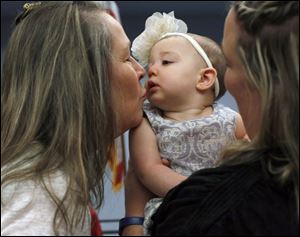
EDITORIAL
Keep the adoption tax credit
11/9/2017Adoption is noble in the minds of most people, and hopeful. It is also a long and expensive journey through layers of bureaucracy.
It costs an average family $34,093 to adopt a child independently and $39,996 to adopt through an agency, according to a 2013 survey of 1,100 families.
The adoption tax credit — a $13,570 nonrefundable credit that phases out for high-income families — is often the financial difference that makes adoption feasible.

Margot Joyner, 8 months, center, who is being adopted, gets a kiss from her grandmother Janet Barnhill, left, while being held by her adoptive mother Nikki Joyner, right, of Swanton, during a public adoption ceremony at Lucas County Children Services to honor "National Adoption Month" on November 6.
Click here to view more Blade editorials
The original Republican tax plan in the House of Representatives proposed to abolish the adoption tax credit entirely.
Rightfully, the House Ways and Means Committee voted 24 to 16 to restore the tax credit to their legislation on Thursday. The Senate’s competing tax bill, which was released on Thursday, also leaves the adoption credit alone.
It was ridiculous to consider nixing the credit in the first place. The elimination of the adoption tax credit would clearly undermine a key pro-life talking point — that adoption is a “viable alternative” to abortion. Actually, it is the only alternative, other than an unprepared mother keeping her baby. So it is hard to fathom why Republicans would make adoption less possible.
Just 0.005 percent of all taxpayers claimed the adoption tax credit in 2014, so scrapping it would likely add up to little government savings. And those small savings could well end up costing the government far more in the long term, specifically when it comes to foster care adoptions.
Economists who have studied adoption incentives estimate that every dollar spent on removing children from foster care and placing them in homes returns $3 in benefits to society. A large portion of those dollars are saved expenditures on criminal justice and special education.
So, moving kids from state facilities into stable homes yields economic rewards for society. But there is also a compelling humanitarian case for making it easier on families to adopt. Let’s hope House Republicans stick with the plan and remember how important this humanitarian tax incentive is to their pro-life position.